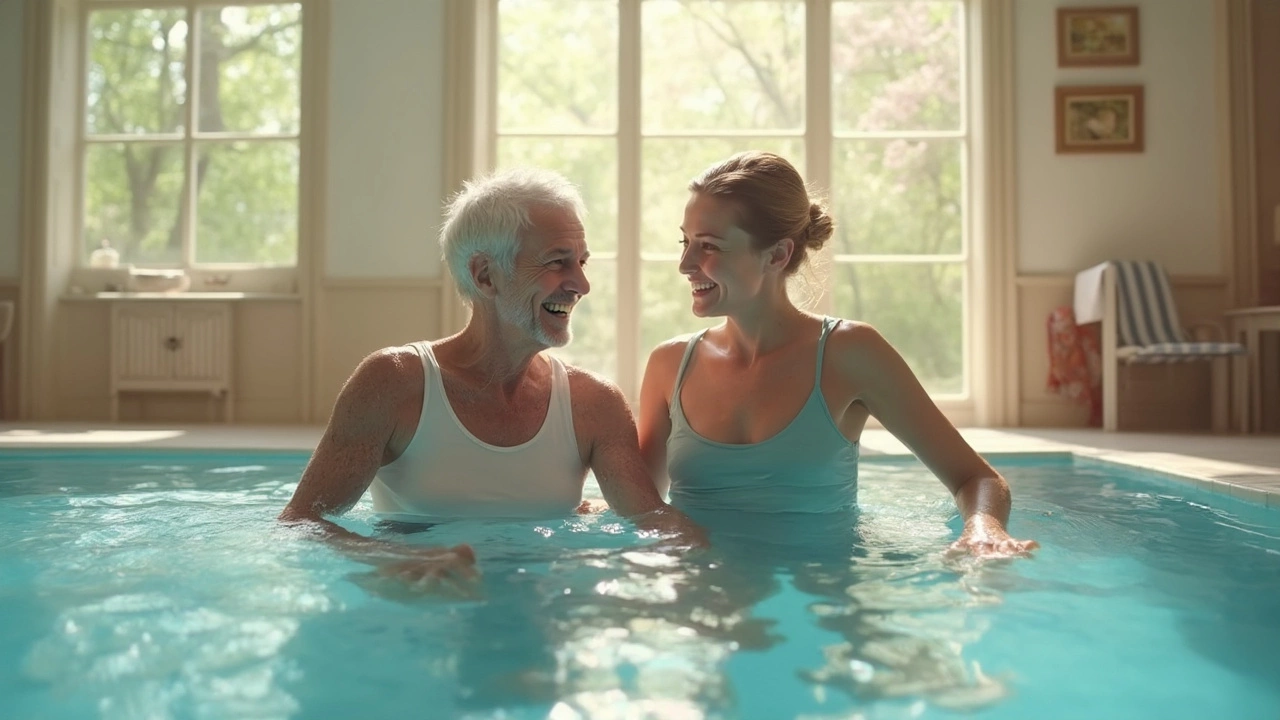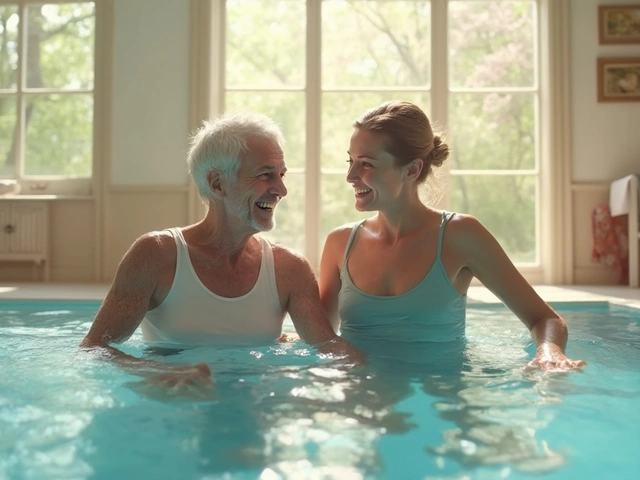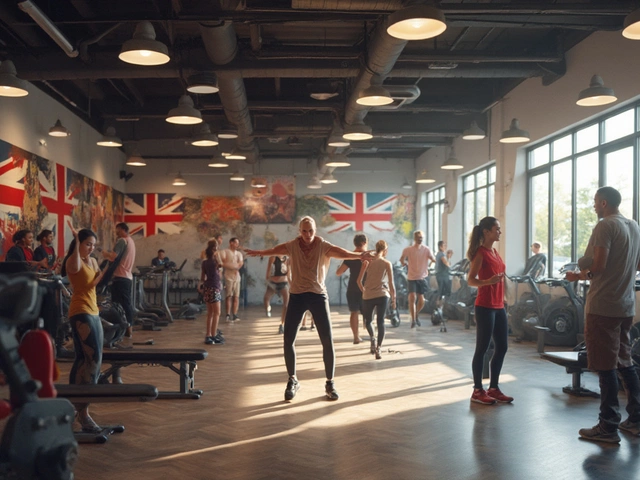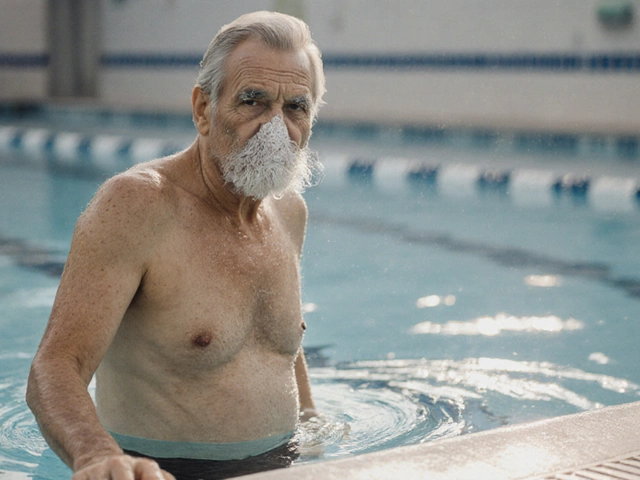Is 60 Too Old to Learn How to Swim?
Ever thought about taking the plunge and learning to swim at 60? You're definitely not the first to mull it over, and you're in good company. Here's the truth: there's no age limit for diving into something new, especially swimming. In fact, getting into the pool can be a fantastic way to stay fit and have fun at the same time.
Worried about physical limitations? Don't fret. Swimming is one of those activities that's easy on the joints while giving your muscles a decent workout. Plus, it keeps your heart happy and healthy. It’s almost like magic for your body without feeling like a strenuous workout.
If you're concerned about looking like a fish out of water, remember everyone starts somewhere. The first step is finding a class or coach that gets your unique pace. And the best part? You can absolutely catch up, even if it's been decades since you last splashed around.
- Why Learn to Swim at 60?
- Physical Benefits of Swimming
- Starting Tips for Older Beginners
- Choosing the Right Swim Class
- Overcoming Common Fears
Why Learn to Swim at 60?
So, you're thinking about learning how to swim at 60, but wondering if it's too late? It’s not just possible; it’s an awesome idea! First off, swimming is a brilliant way to stay in shape without all the heavy pounding on the joints. As our bodies age, we need to be gentle on our knees and hips, and splashing around is surprisingly gentle on these areas.
Now, let’s bust the myth that swimming is only for the young. Many seniors find themselves picking up the pace in the pool because it’s not only about fitness but also about fun! You can set your own speed, whether you’re aiming for a leisurely float or something more intense. Plus, the buoyancy of water gives you a sense of freedom and can alleviate fatigue.
But it’s not all about physical perks. There’s something deeply satisfying about learning something new, no matter your age. Picking up swimming lessons can boost your confidence. Let's face it, impressing your grandkids with your backstrokes at the local swimming club is a surefire way to win some cool points. More importantly, these swimming lessons can better your safety around water, which is an essential skill.
Looking to keep your mind sharp? Swimming is known to improve cognitive function as it gets your blood flowing and heart pumping, which supports brain health. It’s a win-win: mind and body in sync.
| Age Group | Benefits |
|---|---|
| 60-70 | Improved flexibility, heart health |
| 70 and above | Joint relief, cognitive boost |
So, if those thoughts about age have been holding you back, it’s time to toss them aside and hit the pool. With the right attitude and a bit of splash, learning to swim can be as rewarding as anything else you've tackled later in life.
Physical Benefits of Swimming
So why should you hop in the pool at 60? Besides the fun factor, swimming packs a powerful punch when it comes to physical benefits. For one, it’s a full-body workout, engaging multiple muscles without putting any stress on your joints. This makes it perfect if you've got any joint concerns. It’s much easier on your body compared to activities like running.
Swimming is also a fantastic cardiovascular workout. It keeps your heart pumping and can help lower blood pressure. A healthy heart means more energy for everything else you love to do. Plus, spending time in the pool helps enhance flexibility and improves posture. Who doesn’t want to feel more limber and stand taller?
And here’s a cool fact: just 30 minutes of swimming can burn about 200-300 calories, depending on your intensity. It's a stellar way to keep off those extra pounds while having fun. And let’s not forget about lung capacity. Swimming regularly can actually help enlarge your lung capacity, meaning you’ll breathe easier and feel more energized day-to-day.
It doesn’t end there. Swimming can also work wonders for your mental health. The rhythmic nature of swimming, combined with the water’s calming effect, often leaves folks feeling super relaxed afterward. Consider it a wet meditation session.
So, not only are you getting stronger and fitter, but you’re also boosting your mood. Whether you're learning to swim for the first time or brushing off some old skills, the benefits are clear. If you’re ready to give it a go, remember: you're investing in a healthier, happier you.

Starting Tips for Older Beginners
Ready to dive into swimming but unsure where to start? No worries, starting as an older beginner comes with its own set of perks and small hurdles, but nothing you can't handle with a bit of guidance!
First things first, find a swimming lessons class specifically aimed at adult beginners. Not only will the pace be right for you, but you'll also meet some folks in the same boat. Social support can make a world of difference when trying something new. Plus, laughing with others when you unexpectedly splash water in your eyes can be surprisingly comforting!
Getting the right gear is another game-changer. A well-fitting swimsuit and a pair of quality goggles can boost your confidence and keep any water worries at bay. Consider earplugs and swim caps if you're particularly sensitive to water.
Don't rush the process. Start slow, maybe with water familiarity exercises, like just walking in the shallow end. Comfort is key when you're learning to swim as an adult. This phase might feel a bit awkward, but take it from someone who's been there, it’s essential.
It's also helpful to practice breathing techniques. Learning to breathe while swimming is often the trickiest part, but once you get it down, everything else becomes easier. Try taking a deep breath and blowing bubbles in the water—it can feel awkward at first, but it helps develop your rhythm.
Finally, embrace the learning curve. Every stroke might not be perfect, and that's cool. Mistakes are part of the journey. Keep at it, and soon you'll find yourself swimming with more ease and confidence.
Choosing the Right Swim Class
So, you've decided to start swimming lessons at 60? Awesome choice! But before you dive in, you’ll want to find the right class that fits your style and needs. Picking the wrong class can make things tricky, so let’s get you set up for success.
First thing, look for classes specifically designed for adults or seniors. These classes usually factor in different needs and have instructors experienced with teaching older beginners. They know how to handle varying comfort levels and might adjust the pace, so you feel relaxed and secure.
It’s also smart to consider class size. Smaller classes mean more personal attention, allowing instructors to give one-on-one feedback, which can be super helpful. Comfort level plays a significant role in your learning, and knowing that the instructor's got your back can make all the difference.
Before signing up, chat with the instructor or management. Ask about their experience with adult learners. A good teacher will have a patient approach and won't push too hard, understanding that learning at a different pace is okay.
- Research local community centers that offer senior swimming lessons.
- Check reviews or ask friends for recommendations.
- Visit a class before committing to see the vibe and interaction.
Oh, and one more tip: if possible, find out if they offer a trial lesson. This way, you get a taste of what's to come before fully committing. It's like trying a sample at the store—always a good idea.
Lastly, remember that feeling a bit nervous or out of place at first is completely normal. Everyone starts somewhere and the cool thing is you’re about to make new friends with the same goal. You're all in the same boat—so let's make sure it's a great one!
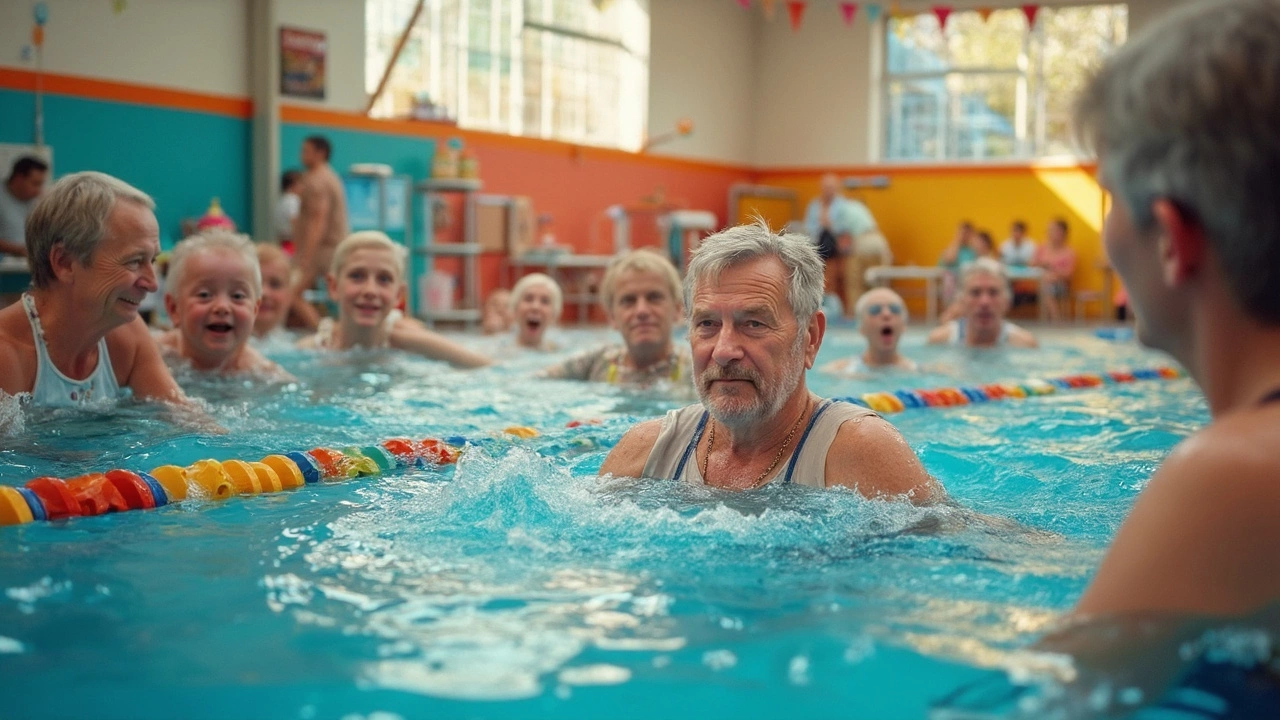
Overcoming Common Fears
Learning to swim as an adult can seem intimidating, especially if you're 60 and up. But these fears, while common, aren't insurmountable. Let's break them down and tackle them head-on.
Fear of Water: This one's a biggie for many taking up swimming lessons later in life. Start by taking slow steps. Get comfortable by simply spending time in the shallow end, letting your feet feel the water and splashing around a bit. It helps to focus on your breathing, staying calm in the water.
Fear of Embarrassment: Feeling self-conscious? Remember, everyone's focused on their own learning, not watching you. If it helps, choose a class specifically for older adults. Being around folks in the same boat can boost your confidence.
Not Knowing How to Float: Floating can feel tricky, but it’s often just about trusting the water to support you. Practice floating with the guidance of your instructor and remember it’s all about finding the balance between relaxing and keeping your core engaged.
Specific Strategies: Here are a few actionable tips to keep in mind:
- Wear a comfortable, well-fitting swimsuit that lets you move without worry.
- Use flotation devices if needed. They'll help you get used to the water without feeling overwhelmed.
- Practice breathing techniques on land. Getting used to the rhythm of breath control when not in the water is a real game-changer.
Starting something new is always a bit daunting, but it's also exhilarating. You’ll find that conquering these fears in swimming can even boost your confidence in everyday life. So, focus on the joy of learning, and pretty soon, you'll be swimming laps like a pro.
